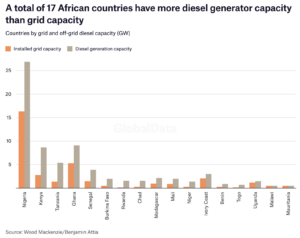April 17th, 2023
Via Energy Monitor, an interesting look at the fact that at least 17 African countries have so many diesel generators that their collective off-grid capacity is greater than that of the power grid itself:
The energy transition asks African countries to do something that has never been done before: develop without the use of fossil fuels. New renewable power capacity will be required to not just replace fossil power and electrify other sectors like transport – as is the case elsewhere in the world – but it will also be needed to provide electricity to millions that do not currently have it.
Some 600 million people still lack access to electricity in Africa today, shows data from the Mo Ibrahim Foundation. This means just 56% of people have access to electricity, compared with 90% across the rest of the world. Per capita energy consumption is lower than any other region, with Africa using 6% of the world’s energy supply for 17% of the world’s population.
Africa therefore needs a massive new supply of power, but high debt and low credit ratings mean governments are not often in a position to spur clean infrastructure investment on a grand scale.
To fill the electricity access gap, off-grid diesel generation is booming across the African continent. Many countries have ineffective grids, fossil fuel subsidies and growing economies hungry for power.
Data from Wood Mackenzie, a global energy consultancy, shows there are now 17 countries that have more off-grid diesel generator capacity than on-grid power generation capacity. The researchers estimate there is now roughly 100GW of operational diesel power across 39 African countries – and they describe this as a “conservative estimate”.
Diesel generation is highly polluting and expensive to run. There is an opportunity for these generators to be replaced by solar PV panels, which offer cheaper power with next-to-zero operational costs. However, these PV panels need to be installed with battery systems, and even then do not offer the same advantages as a grid-connected power system.
A functional power grid can deliver cheap, clean electricity on demand to all homes and businesses that require power. Off-grid power or tempremental grid electricity can be a hindrance to development, with power shortages costing the continent around 2–4% of GDP a year, according to the Mo Ibrahim Foundation.
The prevalence of large hydropower dams across Africa means that 22 African countries use renewables as their primary source of electricity. Yet only one country – Gabon – has more than 90% access to electricity.
The best on-grid renewable power solution for most African countries is utility solar, which is the cheapest, most abundant source of electricity by most measures. Africa has 40% of the world’s solar potential but just 1% of installed solar PV capacity. Five of the ten countries with the potential to generate the most energy per solar panel are in Africa: Namibia (first), Egypt (fourth), Lesotho (eighth), Libya (ninth) and Botswana (tenth).
Significant on-grid solar is on the way, with the current pipeline of projects set to triple capacity across the African continent over the next decade. However, this increase is far below what is required to provide electricity access to all, let alone power new industrial growth.
The countries with the greatest existing and upcoming capacity combined – South Africa, Morocco, Algeria and Egypt – are also among the richest countries on the continent, with more established foreign investment landscapes.
Focusing primarily on The New Seven Sisters - the largely state owned petroleum companies from the emerging world that have become key players in the oil & gas industry as identified by Carola Hoyos, Chief Energy Correspondent for The Financial Times - but spanning other nascent opportunities around the globe that may hold potential in the years ahead, Wildcats & Black Sheep is a place for the adventurous to contemplate & evaluate the emerging markets of tomorrow.

